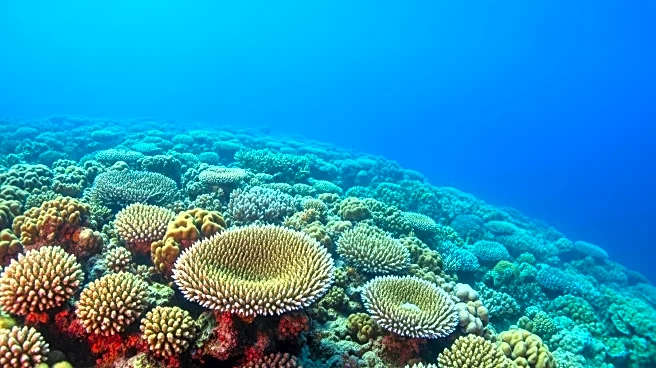What's Happening?
Recent scientific reports indicate that the world has reached a critical climate tipping point, with over 80% of coral reefs experiencing severe bleaching due to rising ocean temperatures. This phenomenon is largely attributed to global warming, which has pushed Earth's systems close to irreversible thresholds. The report, led by Professor Tim Lenton from the University of Exeter, highlights that warm-water coral reefs, essential for nearly a billion people and a quarter of marine life, are passing their thermal tipping point. The current global temperature increase of 1.4°C above pre-industrial levels has already surpassed the threshold of 1.2°C, leading to widespread coral diebacks. Without significant cooling measures, these ecosystems face potential extinction, although some small refuges may survive and require protection.
Why It's Important?
The mass bleaching of coral reefs poses a significant threat to marine biodiversity and the livelihoods of billions who depend on these ecosystems for food and economic activities. The loss of coral reefs could lead to extreme damage to biodiversity, reduced agricultural yields, and substantial economic costs. Furthermore, the report warns of approaching tipping points for ice melt, Amazon rainforest dieback, and vital ocean currents, which could exacerbate global warming impacts. However, there is hope as countries invest in green technologies, such as renewable energy and electric vehicles, to mitigate emissions and trigger positive environmental shifts.
What's Next?
The report suggests that immediate action is necessary to minimize temperature increases and prevent further catastrophic tipping points. Countries are encouraged to accelerate the adoption of green technologies to reduce emissions and stabilize the climate. The scientific community emphasizes the urgency of these measures to ensure a sustainable future and avoid irreversible damage to Earth's ecosystems.
Beyond the Headlines
The potential collapse of the Atlantic Meridional Overturning Circulation (AMOC) and the Amazon rainforest reaching its tipping point before 2°C warming are critical concerns. These developments could lead to significant changes in global climate patterns, affecting weather systems and sea levels. The ethical responsibility to protect vulnerable ecosystems and communities is paramount as the world navigates these environmental challenges.









